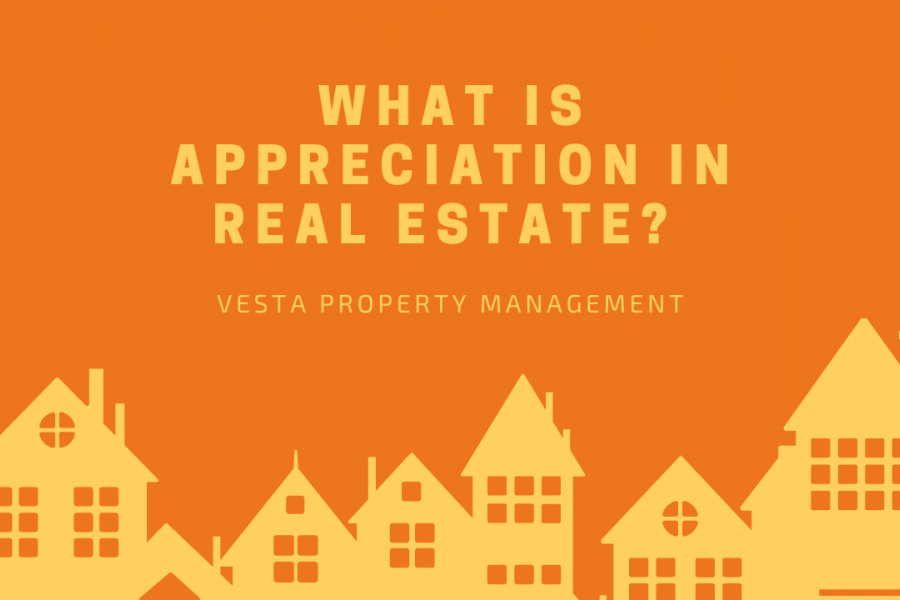
- Understanding Real Estate Appreciation
- Types of Appreciation
- Market Appreciation
- Forced Appreciation
- Factors Influencing Real Estate Appreciation
- Economic Factors
- Local Economy
- Interest Rates
- Inflation
- Location Factors
- Neighborhood Development
- Crime Rates
- Proximity to Urban Centers
- Property-Specific Factors
- Measuring Real Estate Appreciation
- Benefits of Real Estate Appreciation
- Bottom Line
Real estate appreciation means that a property becomes more valuable over time. This value growth can occur due to various factors including market trends, economic conditions, and property improvements.
For landlords, understanding real estate appreciation is crucial. It affects the potential resale value of your property and impacts rental income and overall investment returns. By understanding how appreciation works, you can make informed decisions about buying, managing, and improving your properties.
Understanding Real Estate Appreciation
Appreciation in real estate is simply the increase in the value of a property over time. When the value of your property goes up, it's said to have appreciated.
Types of Appreciation
Market Appreciation
Market appreciation occurs when changes in the real estate market, such as increased demand, lower supply, and favorable economic conditions, lead to bidding wars and higher selling prices.
For instance, a surge in job opportunities in a city can result in an influx of people looking for housing, driving up property prices significantly. Similarly, the establishment of a new transportation hub or major employer in a neighborhood can lead to increased demand for housing and subsequent appreciation in property values.
Forced Appreciation
Forced appreciation occurs when property owners actively enhance the value of their properties through improvements or renovations, such as upgrading the kitchen or adding a bathroom.

By investing in upgrades like installing energy-efficient appliances or renovating outdated bathrooms, landlords can attract higher-quality tenants and command higher rental rates, ultimately increasing the property's overall value.
For instance, transforming a dated kitchen into a modern, stylish space with premium finishes can substantially elevate a property's market appeal and resale value.
Factors Influencing Real Estate Appreciation
Economic Factors
Local Economy
A strong local economy with job growth and low unemployment rates attracts people to the area, increasing demand for housing and pushing property values up.
For example, a city experiencing a boom in the tech industry may see an influx of professionals seeking employment opportunities, driving up demand for housing and subsequently increasing property values.
Interest Rates
When mortgage rates are low, more people can afford to buy homes, which increases demand and drives up property prices.
For instance, when mortgage rates drop below 4%, potential buyers are more inclined to enter the market, competing for limited inventory and driving property prices upward.
Inflation
Generally, as the cost of goods and services rises due to inflation, real estate prices also go up. This is because property values tend to keep pace with or exceed inflation rates over time.
For example, in a city experiencing rapid population growth, property values may escalate as developers struggle to keep pace with housing demand, causing prices to outstrip inflation rates over time.
Location Factors
Neighborhood Development
New amenities like parks and shopping centers make a neighborhood more attractive, boosting property values.

The establishment of recreational facilities and commercial centers not only improves the quality of life for current residents but also attracts new homebuyers, leading to an increase in property values.
Crime Rates
Lower crime rates make an area more desirable, leading to higher property values. Lower crime rates not only contribute to a safer and more secure environment for residents but also enhance the overall perception of the neighborhood.
As a result, potential homebuyers are more inclined to invest in areas with lower crime rates, driving up demand for housing and subsequently increasing property values.
Proximity to Urban Centers
Properties close to city centers or major attractions typically appreciate faster due to higher demand for convenient locations. With easy access to employment opportunities, cultural amenities, and entertainment venues, these properties are in high demand, leading to faster appreciation compared to suburban or rural areas.
Property-Specific Factors
-
Property Condition: Well-maintained properties hold their value better and appreciate more over time. It's crucial to regularly maintain and promptly fix any issues with your property.
-
Size and Layout: Larger properties or those with modern, functional layouts tend to appreciate more due to higher demand from buyers and renters.
Measuring Real Estate Appreciation
- Appreciation Rate: To calculate the annual appreciation rate of a property, subtract the original purchase price from the current market value, divide by the original purchase price, and then divide by the number of years you’ve owned the property. Multiply by 100 to get the percentage.

-
Comparative Market Analysis (CMA): A CMA involves comparing your property with similar properties that have recently sold in the area. This helps estimate the current market value and gauge appreciation.
-
Historical Data: Analyzing past trends in property values in your area can provide insights into future appreciation potential. Historical data helps identify patterns and predict how the market might behave.
Benefits of Real Estate Appreciation
-
Increased Equity: As your property appreciates, the equity – the difference between the property's market value and the outstanding mortgage balance – increases. This equity can be leveraged for further investments or used as collateral for loans.
-
Investment Returns: Real estate appreciation can significantly enhance your investment returns. For example, if you buy a property for $200,000 and it appreciates at 4% annually, it will be worth over $240,000 in five years, not including rental income.
-
Wealth Building: Over time, appreciation contributes to long-term wealth accumulation. Properties that consistently appreciate can provide substantial returns, making real estate a cornerstone of many investment portfolios.
Bottom Line
Understanding and leveraging real estate appreciation is essential for landlords looking to maximize their investment returns. By focusing on key factors that influence appreciation, such as local economic conditions, neighborhood development, and property maintenance, landlords can make informed decisions to enhance the value of their properties.
Vesta Property Management can play a pivotal role in this process. With expertise in property management and market analysis, Vesta Property Management helps landlords navigate the complexities of real estate investment.
From maintaining property conditions to advising on profitable improvements and analyzing market trends, Vesta Property Management ensures that your properties appreciate in value, providing you with peace of mind and higher returns on your investment.
Let Vesta Property Management help you unlock the full potential of your real estate investments.